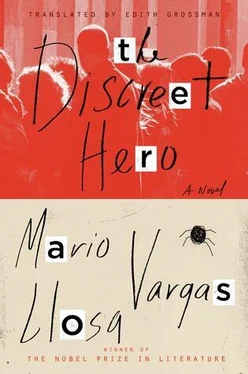“Well, how lucky to have had a father like that, Don Felícito,” said Don Rigoberto, getting to his feet. “You won’t regret this trip, I assure you. Madrid and Rome are cities full of interesting things, you’ll see.”
“Yes, I wish you the best,” the other man said, standing up as well. “My regards to your wife.”
But it seemed to Rigoberto that he wasn’t at all convinced, that he wasn’t at all hopeful about the trip, that he was sacrificing himself for his wife. He asked Felícito if his problems had been resolved and then immediately regretted it when he saw a strand of worry or sadness cross the face of the small man in front of him.
“Luckily everything’s resolved,” he murmured. “I hope this trip at least makes the Piurans forget about me. You don’t know how horrible it is to become well known, to appear in the papers and on television, to have people point you out on the street.”
“I believe it, I believe it,” said Don Rigoberto, patting him on the shoulder. He called over the waiter and insisted on paying the entire bill. “All right, we’ll see each other on the plane. My wife and son are over there looking for me. So long.”
They went to the departure gate but boarding hadn’t begun yet. Rigoberto told Lucrecia and Fonchito that the Yanaqués were traveling to Europe as Armida’s guests. His wife was moved by the generosity of Ismael Carrera’s widow.
“You don’t see things like that these days,” she said. “I’ll say hello to them on the plane. They put her up for a few days in their house and didn’t suspect they’d win the lottery because of that good deed.”
In the duty-free shop she’d bought several chains of Peruvian silver to give as mementos to nice people they met on the trip, and Fonchito had bought a DVD of Justin Bieber, a Canadian singer who was driving young people wild all over the world. He’d watch it on the plane on his computer. Rigoberto began to leaf through The Economist but then remembered that he’d better carry in his hand the book he’d chosen to read on the trip. He opened his carry-on and took out his old copy, bought at a bouquiniste on the banks of the Seine, of André Malraux’s essay on Goya: Saturn . For many years he’d selected carefully what he read on the plane. Experience had shown him that during a flight, he couldn’t read just anything. It had to be exciting, something that would concentrate his attention enough to cancel out completely the subliminal preoccupation that arose in him whenever he flew, remembering he was ten thousand meters high — ten kilometers — moving at a speed of nine hundred or a thousand kilometers an hour, and outside the temperature was fifty or sixty degrees below zero. It wasn’t exactly fear he felt when he flew but something even more intense, the certainty that any moment might be the end, the disintegration of his body in a fraction of a second and, perhaps, the revelation of the great mystery: knowing what, if anything, lay beyond death, a possibility that from the point of view of his old agnosticism, scarcely attenuated by the years, he tended to reject. But a certain kind of reading managed to put a stop to that ominous sensation, reading that could absorb him so much he forgot everything else. It had happened to him with a novel by Dashiell Hammett, Italo Calvino’s Six Memos for the Next Millennium , Claudio Magris’s Danube , and while rereading Henry James’s The Turn of the Screw. This time he’d chosen Malraux’s essay because he remembered the emotion he felt the first time he read it, the longing it awoke in him to see in real life, not in reproductions in books, the frescoes at the Quinta del Sordo and the etchings The Disasters of War and Los Caprichos . Every time he’d been in the Prado he spent time in the rooms with the Goyas. Rereading Malraux’s essay would be a nice anticipation of that pleasure.
It was wonderful that the unpleasant story had finally been settled. He was firmly resolved not to allow anything to ruin these weeks. Everything had to be pleasant, beautiful, pleasing. He wouldn’t see anyone or anything that might turn out to be depressing, irritating, or ugly; he would organize all their moves so that for an entire month he’d have the permanent feeling that happiness was possible, and everything he did, heard, saw, and even smelled (this last not so easy, obviously) would contribute to it.
He was deep in this lucid daydream when he felt Lucrecia’s elbow indicating that boarding had begun. In the distance they saw that Don Felícito and Doña Gertrudis were boarding in business class. The line for economy passengers was very long, of course, which meant that the plane was full. In any event, Rigoberto felt calm; he’d asked the travel agency to reserve the three seats in the tenth row, next to the emergency door, which had more leg room and made the discomforts of the flight easier to bear.
When she walked onto the plane, Lucrecia shook hands with the Piurans, and the couple greeted her with a great deal of affection. Rigoberto and his family were in fact placed in the row next to the emergency door, with ample room for their legs. He sat beside the window, Lucrecia on the aisle, and Fonchito in the middle.
Don Rigoberto sighed. He heard without listening the instructions someone from the crew was giving about the flight. When the plane began to taxi along the runway toward the point of takeoff, he’d managed to become interested in an editorial in The Economist about whether the euro, the common currency, would survive the crisis shaking Europe, and whether the European Union would survive the disappearance of the euro. When, with the four engines roaring, the plane pulled away at a speed that increased by the second, he suddenly felt Fonchito’s hand pressing his right arm. He looked away from the magazine and turned to his son: The boy was looking at him in astonishment, with an indescribable expression on his face.
“Don’t be afraid, son,” he said in surprise, but then he stopped talking because Fonchito was shaking his head, as if to say, “It’s not that, it’s not that.”
The plane had just left the ground and the boy’s hand clutched at his arm as if he wanted to hurt him.
“What is it, Fonchito?” he asked, glancing at Lucrecia in alarm, but she didn’t hear them over the noise of the engines. His wife had her eyes closed and seemed to be dozing or praying.
Fonchito was trying to tell him something but though his mouth moved, no words passed his lips. He was very pale.
An awful premonition made Don Rigoberto lean toward his son and murmur in his ear, “We’re not going to allow Edilberto Torres to fuck up this trip, are we, Fonchito?”
Now the boy did manage to speak, and what Don Rigoberto heard froze his blood.
“He’s here, Papa, here on the plane, sitting right behind you. Yes, yes, Señor Edilberto Torres.”
Rigoberto felt a tug at his neck and it seemed to be bruised and injured. He couldn’t move his head, turn around to look at the seat behind him. His neck hurt horribly and his head had begun to boil. He had the stupid idea that his hair was smoking like a bonfire. Could it be possible that the son of a bitch was here, on this plane, traveling with them to Madrid? Fury rose in his body like irresistible lava, a savage desire to stand and attack Edilberto Torres, hit and insult him without pity until he was exhausted. In spite of the sharp pain in his neck, he finally managed to turn his upper body. But in the row behind him there was no man at all, only two older women and a little girl with a lollipop. Disconcerted, he turned to look at Fonchito, and he was greeted by a surprise: His son’s eyes were sending out sparks of mockery and joy. And at that instant he burst into laughter.
Читать дальше

![Гарри Гаррисон - Bill, the Galactic Hero [= The Starsloggers]](/books/87536/garri-garrison-bill-the-galactic-hero-the-star-thumb.webp)










